Two types of microscopes - Study guides, Class notes & Summaries
Looking for the best study guides, study notes and summaries about Two types of microscopes? On this page you'll find 314 study documents about Two types of microscopes.
Page 2 out of 314 results
Sort by
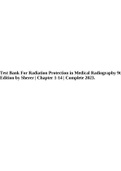
-
Test Bank For Radiation Protection in Medical Radiography 9th Edition by Sherer | Chapter 1-14 | Complete 2023.
- Exam (elaborations) • 71 pages • 2023
-
- $22.99
- 1x sold
- + learn more
Test Bank For Radiation Protection in Medical Radiography 9th Edition by Sherer | Chapter 1-14 | Complete 2023. Chapter 01: Introduction to Radiation Protection Sherer: Radiation Protection in Medical Radiography, 9th Edition MULTIPLE CHOICE 1. Consequences of ionization in human cells include 1. creation of unstable atoms. 2. production of free electrons. 3. creation of highly reactive free radicals capable of producing substances poisonous to the cell. 4. creation of new biologic mole...
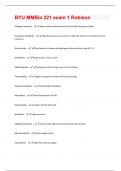
-
BYU MMBio 221 exam 1 Robison Questions With All Correct Answers Already Passed!!
- Exam (elaborations) • 11 pages • 2024
- Available in package deal
-
- $7.99
- + learn more
Obligate halophiles - High osmotic pressure aka lots of salt like the great salt lake Facultative halophiles - Type that causes acne can be in salty also known as osmolaric but not nessesary Neutrophiles - Most bacteria Protozoa and pathogens like neutral ph rang 6.5-7.5 Acidophiles - Really acidic as low as 0 pH Alkalineophiles - Grow best in basic range up to 11.5 ex cholera Thermophiles - Higher temperatures above 45C ex hot springs Hyperthermophiles - Hottest 80C and above Mesophiles...
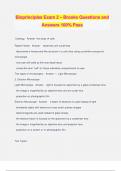
-
Bioprinciples Exam 2 – Brooks Questions and Answers 100% Pass
- Exam (elaborations) • 42 pages • 2024
-
- $13.49
- + learn more
Bioprinciples Exam 2 – Brooks Questions and Answers 100% Pass Cytology - Answer- the study of cells Robert Hooke - Answer- - observed cork could float - discovered a honeycomb-like structure in a cork slice using a primitive compound microscope - only saw cell walls as this was dead tissue - coined the term "cell" for these individual compartments he saw Two types of microscopes: - Answer- 1. Light Microscope 2. Electron Microscope Light Microscope - Answer- - light is focused on s...
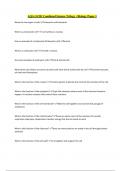
-
AQA GCSE Combined Science Trilogy : Biology Paper 1
- Exam (elaborations) • 33 pages • 2024
-
Available in package deal
-
- $10.49
- + learn more
AQA GCSE Combined Science Trilogy : Biology Paper 1 Name the two types of cells Prokaryotic and Eukaryotic What is a prokaryotic cell? A cell without a nucleus Give an example of a prokaryote (Prokaryotic cell) Bacteria What is a eukaryotic cell? cell with a nucleus Give two examples of eukaryotic cells Plant & Animal cells What three sub-cellular structures do plant cells have which animal cells do not? Permanent vacuole, cell wall and chloroplasts What is the function of the nu...
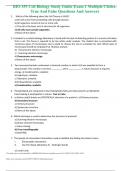
-
BIO 353 Cell Biology Study Guide Exam 1 Multiple Choice/ True And False Questions And Answers
- Exam (elaborations) • 6 pages • 2024
-
Available in package deal
-
- $11.49
- + learn more
BIO 353 Cell Biology Study Guide Exam 1 Multiple Choice/ True And False Questions And Answers Which of the following about the Cell Theory is FALSE? a) All cells come from preexisting cells through division b) All organisms consist of one or more cells c) The cell is the basic unit of structure for all organisms d) All cells must contain organelles e) None of the above 2. A student in a cellular biology laboratory is faced with the task of detecting protein X in muscle cells taken from ...
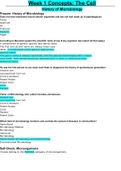
-
BIOS 242 Week 1 Concepts; The Cell
- Other • 23 pages • 2023
- Available in package deal
-
- $35.49
- 1x sold
- + learn more
Prepare: History of Microbiology • Does not have membrane bound cellular organelles and has cell wall made up of peptidoglycan: • According to Binomial system the scientific name of any living organism has (select all that apply): • He was the first person to use swan neck flask to disapprove the theory of spontaneous generation: • Father of Microbiology who called microbes animalcules: • Which field of microbiology monitors and controls the spread of diseases in communities? S...
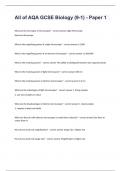
-
All of AQA GCSE Biology (9-1) - Paper 1 Questions Fully Solved.
- Exam (elaborations) • 32 pages • 2024
-
Available in package deal
-
- $14.99
- + learn more
What are the two types of microscopes? - correct answer Light Microscope Electron Microscope What is the magnifying power of a light microscope? - correct answer x 2,000 What is the magnifying power of an electron microscope? - correct answer x 2,000,000 What is the resolving power? - correct answer The ability to distinguish between two separate points What is the resolving power of light microscopes? - correct answer 200 nm What is the resolving power of electron microscopes? -...
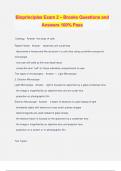
-
Bioprinciples Exam 2 – Brooks Questions and Answers 100% Pass
- Exam (elaborations) • 42 pages • 2024
- Available in package deal
-
- $13.49
- + learn more
Bioprinciples Exam 2 – Brooks Questions and Answers 100% Pass Cytology - Answer- the study of cells Robert Hooke - Answer- - observed cork could float - discovered a honeycomb-like structure in a cork slice using a primitive compound microscope - only saw cell walls as this was dead tissue - coined the term "cell" for these individual compartments he saw Two types of microscopes: - Answer- 1. Light Microscope 2. Electron Microscope Light Microscope - Answer- - light is focused on s...
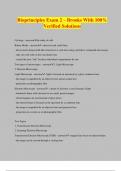
-
Bioprinciples Exam 2 – Brooks With 100% Verified Solutions
- Exam (elaborations) • 31 pages • 2024
- Available in package deal
-
- $13.49
- + learn more
Bioprinciples Exam 2 – Brooks With 100% Verified Solutions Cytology - answerthe study of cells Robert Hooke - answer- observed cork could float - discovered a honeycomb-like structure in a cork slice using a primitive compound microscope - only saw cell walls as this was dead tissue - coined the term "cell" for these individual compartments he saw Two types of microscopes: - answer1. Light Microscope 2. Electron Microscope Light Microscope - answer- light is focused on specimen by a...
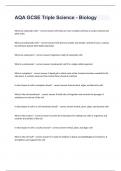
-
AQA GCSE Triple Science - Biology Advanced Question And Answer.
- Exam (elaborations) • 44 pages • 2024
-
Available in package deal
-
- $14.99
- + learn more
What are eukaryotic cells? - correct answer Cells that are more complex and have a nucleus (animal and plant cells) What are prokaryotic cells? - correct answer Cells that are smaller and simpler, and don't have a nucleus but still have genetic information (bacteria) What are eukaryotes? - correct answer Organisms made of eukaryotic cells What is a prokaryote? - correct answer A prokaryotic cell (it's a single celled organism) What is cytoplasm? - correct answer A liquid gel in whi...

That summary you just bought made someone very happy. Also get paid weekly? Sell your study resources on Stuvia! Discover all about earning on Stuvia


